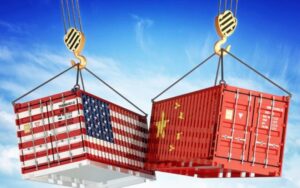How U.S.-China Tariffs Impact the Stock Market: What Investors Need to Know
Understanding the Tariff Battle
The U.S.-China trade war has been a defining feature of global economic relations for years. The latest round of U.S. tariffs on China and China’s retaliatory measures are reigniting concerns about supply chain disruptions, increased production costs, and overall market volatility. Investors are closely monitoring how these policies could impact corporate earnings, economic growth, and sector-specific trends.
Immediate Stock Market Reactions
Historically, when tariffs have been announced or escalated, the stock market has reacted swiftly. The most affected sectors include:
- Technology: Many U.S. tech giants, including Apple and Nvidia, rely on Chinese manufacturing and supply chains. Higher tariffs could increase costs and reduce profit margins.
- Manufacturing and Industrial Stocks: Companies like Boeing and Caterpillar that depend on global trade may face lower demand and supply chain disruptions.
- Consumer Goods: U.S. retailers that import goods from China, such as Walmart and Target, might pass on higher costs to consumers, potentially dampening consumer spending.
Related Reading:
Economic Growth and Inflation Concerns
One of the key concerns is how these tariffs will impact U.S. economic growth and inflation:
- Higher Prices for Consumers: Tariffs act as an indirect tax, increasing costs for businesses and consumers. With inflation already a major concern in 2024, additional tariffs could exacerbate price pressures.
- Supply Chain Disruptions: Many U.S. companies source materials and products from China. Tariffs could force businesses to restructure their supply chains, leading to temporary slowdowns and inefficiencies.
- Federal Reserve Policy Implications: If tariffs contribute to inflation, the Federal Reserve may respond with a tighter monetary policy, affecting stock valuations and interest rates.
Further Insights:
China’s Retaliatory Tariffs and Their Impact on U.S. Companies
China has responded with its own tariffs, primarily targeting:
- Agricultural Exports: Soybeans, corn, and pork are among the hardest-hit U.S. exports, putting pressure on American farmers.
- Automobile Industry: U.S. automakers like Tesla and General Motors face potential sales declines in the Chinese market.
- Luxury and Consumer Goods: American brands with significant Chinese customer bases, such as Nike and Starbucks, may experience reduced demand due to tariffs or consumer boycotts.
What This Means for Investors
Investors should prepare for increased market volatility as trade tensions evolve. Some strategies to consider:
- Diversification: Reducing exposure to sectors most affected by tariffs and focusing on resilient industries.
- Monitoring Economic Data: Watching for key reports on inflation, GDP growth, and corporate earnings to gauge potential market shifts.
- Hedging Strategies: Using options or sector rotation strategies to manage risks associated with trade-related market swings.
Conclusion
The ongoing U.S. tariffs on China and the resulting retaliatory measures are reshaping the stock market landscape. While certain industries face challenges, others may find opportunities in shifting global trade patterns. Investors should stay informed, adapt strategies, and closely watch geopolitical developments for signs of further escalation or resolution.

